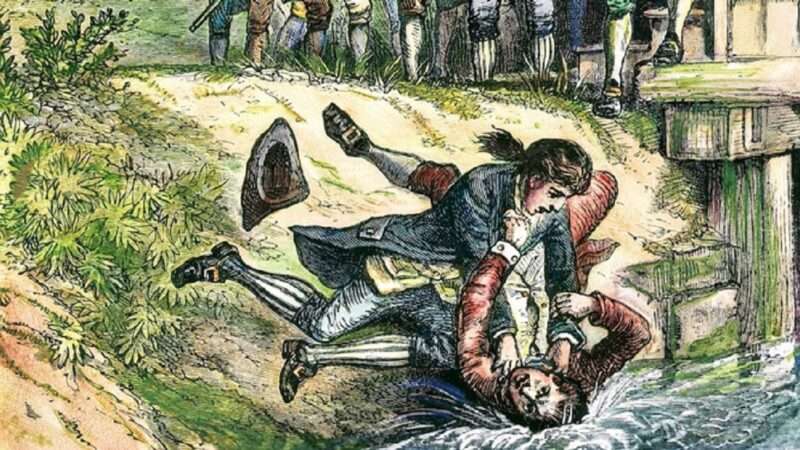

Steve Calabresi has posted an impressively swift response to my post explaining why the January 6, 2021 attack on the Capitol was an insurrection. But I remain unpersuaded. Steve's emphasis on the use of the word "rebellion"—in addition to "insurrection"—in Section 3 of the 14th Amendment only reinforces my point.
Steve relies on the legal rule of noscitur a sociis, which is the idea that words in a statute should be understood by reference to their "associates," in this case that "insurrection" should be understood as similar to "rebellion" because in Section 3 both occur in the same phrase ("insurrection or rebellion"). He then argues that "rebellion" is limited to uprisings on a scale comparable to the Civil War.
While it is reasonable to read the two words together, one can't be interpreted in such a way as to render the other redundant. That would violate another longstanding rule of legal interpretation: the canon against superfluity, which, as Justice Scalia and Bryan Garner explain in Reading Law, requires courts to give effect to "every word and every provision" in a law and to ensure that "none should be needlessly given an interpretation that duplicates another provision" (quoting US v. Butler (1936)). While "insurrection" and "rebellion" may overlap and be similar, it is perfectly plausible that one may include some uprisings too small to be included in the other. If they were completely identical, one term would be rendered superfluous. Thus, my explanation of how the January 6 attack fits any plausible definition of "insurrection" (including Steve's own preferred definition from the 1828 Webster's dictionary) remains unrefuted.
In addition, the events of January 6 fit any plausible definition of "rebellion," as well—including, once again, Steve's own preferred definition. There is no reason to believe that a "rebellion" must be on a scale comparable to the Civil War, or anything like it. There is nothing incoherent or implausible about the idea of a small-scale rebellion that is quickly suppressed. Such rebellions are actually far more common than large and prolonged ones!
Consider the two most famous pre-Civil War events in American history generally labeled rebellions: Shay's Rebellion (1786-87), and the Whiskey Rebellion (1793). Both were on a scale similar to the January 6 attack. Each involved no more than a few thousand rebels (only about 600 in the case of the Whiskey Rebellion; many fewer than January 6). Each occurred in one part of just one state (western Massachusetts and western Pennsylvania, respectively). The number of combat fatalities (9 for Shay's Rebellion, 3-4 for the Whiskey Rebellion, 5 on January 6) is also similar.
The two 18th century uprisings did take longer to suppress than January 6 did. But that was in large part because a comparable number of rebels were spread over a larger area. Plus, the military response to the two revolts was slow to develop and eighteenth century transportation technology made it harder to move troops quickly than is the case today.
I would add that the objectives of Shays Rebellion (debt relief) and the Whiskey Rebellion (repealing the federal whiskey tax) were more limited than those of the January 6 rebels (seizing control of the most powerful office in the land and denying it to the rightfully elected candidate). In that respect, January 6 was actually more clearly a rebellion than either of the other two.
Relying again on the 1828 Webster's Dictionary, Steve defines "rebellion" as "An open and avowed renunciation of the government to which one owes allegiance; or the taking of arms traitorously to resist the authority of lawful government; revolt." The January 6 attack easily falls within this definition. The people who attacked the Capitol clearly took "up arms" and "resist[ed] the authority of the lawful government." Indeed, their purpose was to enable Trump to illegally continue to wield that authority. The fact they believed it rightfully belonged to him does not change the nature of their actions, for reasons I outlined in a previous post. Notice also that Steve's preferred definition indicates no minimum scale that an uprising must reach before it can be considered a "rebellion." A small "revolt" qualifies no less than a big one.
Steve asks whether, under my approach, the 2020 "Black Lives Matter" riots also qualify as insurrections. In my view, the answer is probably not, because the rioters did not seek to take control of the powers of government. Unlike the participants in the Whiskey and Shays' rebellions, most didn't even seek the repeal of specific laws. But if some did seize government power (the case of the "CHOP" group, which took control of parts of the Seattle for several weeks may be an example), then their actions do qualify as "insurrection." I have no problem biting that bullet.
Of course, only those participants who previously held various types of public offices can be disqualified under Section 3. Some Seattle officials apparently helped CHOP. If Steve—or anyone else—wants to get these people disqualified from future office-holding under Section 3, I think they might have a good case.
In sum, January 6 was an insurrection—including under Steve's preferred definition of that term. And, to the extent it matters, it probably counts as a "rebellion" as well.
UPDATE: Steve Calabresi has posted an additional rejoinder responding to this post here. He argues that Section 3 applies only to "rebellions" or "insurrections" that are comparable in scale to the Civil War, which is the "paradigm" case the section was intended to address. But Section 3 speaks in general terms of insurrection and rebellion, and requires disqualifying all covered government officials who "engage" in them. That strongly suggests it was meant to apply to all insurrections and rebellions, not just some subset that may be seen as similar to the Civil War. Steve provides no textual or original meaning evidence to the contrary.
It would make little sense to exempt insurrectionists from the ban merely because their attempts to overthrow the government were ineffective and relatively easily crushed. The whole point of Section 3 is to prevent such people from getting a second chance to subvert the republic. People who try one insurrection that fails miserably may be more effective the next time around! They could even learn from their previous mistakes.
The Constitution has many provisions that were enacted in response to a "paradigm" case (or cases), but nonetheless apply more generally. The Fourteenth Amendment's restrictions on racial and ethnic discrimination was enacted in response to southern states' oppression of blacks, but nonetheless protects other groups, too, and ban state-sponsored racial discrimination that takes forms different from those of the Black Codes of the 1860s. The First Amendment was enacted in response to specific types of censorship and oppression of religious minorities practiced by eighteenth century Britain, but nonetheless protects freedom of speech and religion more broadly.
Finally, it is not true the mob attacking the Capitol "peacefully dispersed on Donald Trump's request." They fled because they were defeated after extensive fighting, and reinforcements arrived to assist the initially overwhelmed Capitol Police. Trump did not issue any request to disperse until after it was clear that the attack he inspired was on its way to defeat. Until that point, evidence indicates he was cheering on the mob (much of it summarized by the Colorado Supreme Court in its Section 3 decision), and trying to use the attack as leverage to pressure members of Congress into refusing to certify the election results.
At this point, we are probably in the realm of diminishing returns in this exchange. I will leave off, unless some significant new point is raised. Many thanks to Steve for his insights.
The post Insurrection, Rebellion, and January 6: Rejoinder to Steve Calabresi [updated with brief further rejoinder] appeared first on Reason.com.







